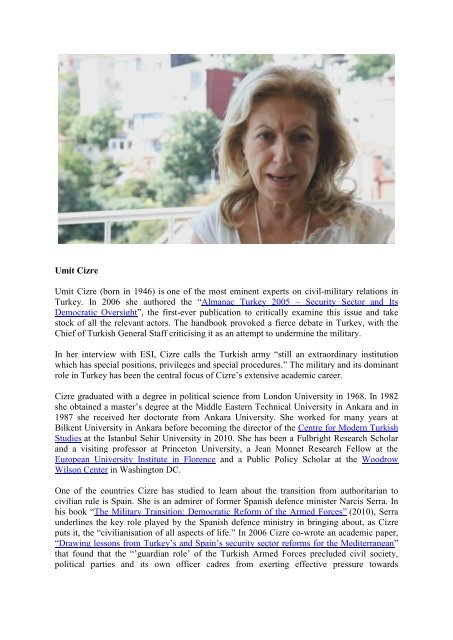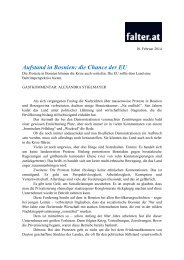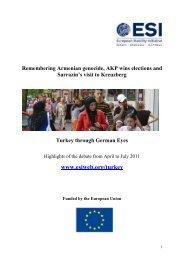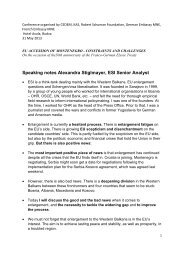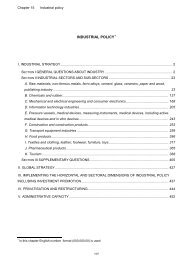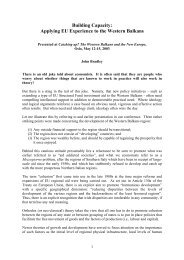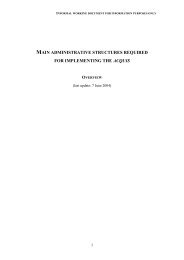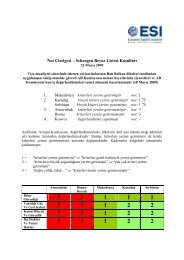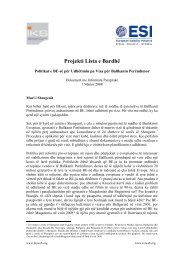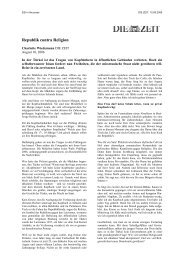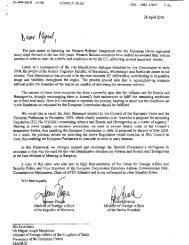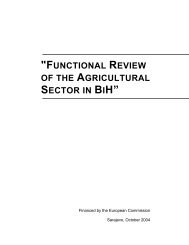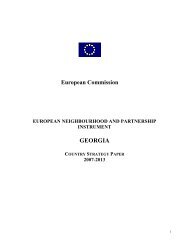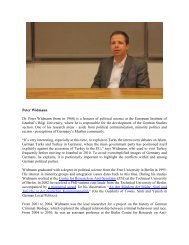Umit Cizre Umit Cizre (born in 1946) is one of the most eminent ... - ESI
Umit Cizre Umit Cizre (born in 1946) is one of the most eminent ... - ESI
Umit Cizre Umit Cizre (born in 1946) is one of the most eminent ... - ESI
You also want an ePaper? Increase the reach of your titles
YUMPU automatically turns print PDFs into web optimized ePapers that Google loves.
<strong>Umit</strong> <strong>Cizre</strong><br />
<strong>Umit</strong> <strong>Cizre</strong> (<strong>born</strong> <strong>in</strong> <strong>1946</strong>) <strong>is</strong> <strong>one</strong> <strong>of</strong> <strong>the</strong> <strong>most</strong> em<strong>in</strong>ent experts on civil-military relations <strong>in</strong><br />
Turkey. In 2006 she authored <strong>the</strong> “Almanac Turkey 2005 – Security Sector and Its<br />
Democratic Oversight”, <strong>the</strong> first-ever publication to critically exam<strong>in</strong>e th<strong>is</strong> <strong>is</strong>sue and take<br />
stock <strong>of</strong> all <strong>the</strong> relevant actors. The handbook provoked a fierce debate <strong>in</strong> Turkey, with <strong>the</strong><br />
Chief <strong>of</strong> Turk<strong>is</strong>h General Staff critic<strong>is</strong><strong>in</strong>g it as an attempt to underm<strong>in</strong>e <strong>the</strong> military.<br />
In her <strong>in</strong>terview with <strong>ESI</strong>, <strong>Cizre</strong> calls <strong>the</strong> Turk<strong>is</strong>h army “still an extraord<strong>in</strong>ary <strong>in</strong>stitution<br />
which has special positions, privileges and special procedures.” The military and its dom<strong>in</strong>ant<br />
role <strong>in</strong> Turkey has been <strong>the</strong> central focus <strong>of</strong> <strong>Cizre</strong>’s extensive academic career.<br />
<strong>Cizre</strong> graduated with a degree <strong>in</strong> political science from London University <strong>in</strong> 1968. In 1982<br />
she obta<strong>in</strong>ed a master’s degree at <strong>the</strong> Middle Eastern Technical University <strong>in</strong> Ankara and <strong>in</strong><br />
1987 she received her doctorate from Ankara University. She worked for many years at<br />
Bilkent University <strong>in</strong> Ankara before becom<strong>in</strong>g <strong>the</strong> director <strong>of</strong> <strong>the</strong> Centre for Modern Turk<strong>is</strong>h<br />
Studies at <strong>the</strong> Istanbul Sehir University <strong>in</strong> 2010. She has been a Fulbright Research Scholar<br />
and a v<strong>is</strong>it<strong>in</strong>g pr<strong>of</strong>essor at Pr<strong>in</strong>ceton University, a Jean Monnet Research Fellow at <strong>the</strong><br />
European University Institute <strong>in</strong> Florence and a Public Policy Scholar at <strong>the</strong> Woodrow<br />
Wilson Center <strong>in</strong> Wash<strong>in</strong>gton DC.<br />
One <strong>of</strong> <strong>the</strong> countries <strong>Cizre</strong> has studied to learn about <strong>the</strong> transition from authoritarian to<br />
civilian rule <strong>is</strong> Spa<strong>in</strong>. She <strong>is</strong> an admirer <strong>of</strong> former Span<strong>is</strong>h defence m<strong>in</strong><strong>is</strong>ter Narc<strong>is</strong> Serra. In<br />
h<strong>is</strong> book “The Military Transition: Democratic Reform <strong>of</strong> <strong>the</strong> Armed Forces” (2010), Serra<br />
underl<strong>in</strong>es <strong>the</strong> key role played by <strong>the</strong> Span<strong>is</strong>h defence m<strong>in</strong><strong>is</strong>try <strong>in</strong> br<strong>in</strong>g<strong>in</strong>g about, as <strong>Cizre</strong><br />
puts it, <strong>the</strong> “civilian<strong>is</strong>ation <strong>of</strong> all aspects <strong>of</strong> life.” In 2006 <strong>Cizre</strong> co-wrote an academic paper,<br />
“Draw<strong>in</strong>g lessons from Turkey’s and Spa<strong>in</strong>’s security sector reforms for <strong>the</strong> Mediterranean”<br />
that found that <strong>the</strong> “’guardian role’ <strong>of</strong> <strong>the</strong> Turk<strong>is</strong>h Armed Forces precluded civil society,<br />
political parties and its own <strong>of</strong>ficer cadres from exert<strong>in</strong>g effective pressure towards
democratic reform and readdress<strong>in</strong>g <strong>the</strong> civil-military balance,” while <strong>in</strong> Spa<strong>in</strong> both civil<br />
society and political parties broke <strong>the</strong> res<strong>is</strong>tance <strong>of</strong> <strong>the</strong> military.<br />
<strong>Cizre</strong>’s work on civil-military relations and <strong>the</strong> 2005 almanac – which was publ<strong>is</strong>hed by<br />
TESEV (Turk<strong>is</strong>h Economic and Social Studies Foundation), an <strong>in</strong>dependent th<strong>in</strong>k-tank <strong>in</strong><br />
Turkey, and <strong>the</strong> Geneva Centre for <strong>the</strong> Democratic Control <strong>of</strong> Armed Forces – has catapulted<br />
her to fame. She has also written on o<strong>the</strong>r topics, such as Turkey’s AKP party, which has<br />
been <strong>in</strong> power <strong>in</strong> Turkey s<strong>in</strong>ce 2002. Her work <strong>in</strong>cludes <strong>the</strong> book “Secular and Islamic<br />
politics <strong>in</strong> Turkey. The mak<strong>in</strong>g <strong>of</strong> <strong>the</strong> Justice and Development Party“ (2007) and various<br />
articles <strong>in</strong>clud<strong>in</strong>g “Turkey at <strong>the</strong> Crossroads: from ‘Change with Politics as Usual’ to<br />
‘Politics with Change as Usual’”, <strong>in</strong> which she analyses <strong>the</strong> AKP’s “new roadmap” after <strong>the</strong><br />
elections <strong>in</strong> June 2011.<br />
In <strong>the</strong> article “Conceiv<strong>in</strong>g <strong>the</strong> New Turkey After Ergenekon” (2010), <strong>Cizre</strong> and Joshua<br />
Walker, a Transatlantic Fellow at <strong>the</strong> German Marshall Fund <strong>in</strong> Wash<strong>in</strong>gton, exam<strong>in</strong>e <strong>the</strong><br />
impact <strong>of</strong> <strong>the</strong> Ergenekon case on civil-military relations. Her conclusion, which she also<br />
d<strong>is</strong>cusses <strong>in</strong> her <strong>in</strong>terview with <strong>ESI</strong>, <strong>is</strong> that “Ergenekon creates <strong>the</strong> opportunity for a smarter,<br />
<strong>in</strong>telligent leadership that sees <strong>the</strong> benefits <strong>of</strong> democratic, civilian control.”<br />
In her <strong>in</strong>terview with <strong>ESI</strong>, <strong>Cizre</strong> talks about civil-military relations, <strong>the</strong> changes <strong>of</strong> <strong>the</strong> recent<br />
months and years, <strong>the</strong> different actors, and <strong>the</strong> <strong>in</strong>dictments <strong>of</strong> military staff <strong>in</strong> <strong>the</strong> Ergenekon<br />
case. She <strong>is</strong> an optim<strong>is</strong>t. “I am happy to see that <strong>the</strong> country <strong>is</strong> on <strong>the</strong> right path. It has taken<br />
long, it has been pa<strong>in</strong>ful, very difficult and very tiresome,” she says. “However, we have<br />
come to <strong>the</strong> right po<strong>in</strong>t now... Th<strong>is</strong> ideology <strong>in</strong> Turkey, th<strong>is</strong> Kemal<strong>is</strong>m, th<strong>is</strong> guardianship role<br />
has been <strong>the</strong> source <strong>of</strong> Turkey’s problems, problems <strong>of</strong> not mak<strong>in</strong>g progress <strong>in</strong> democracy.”


